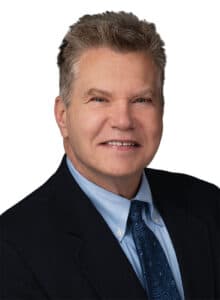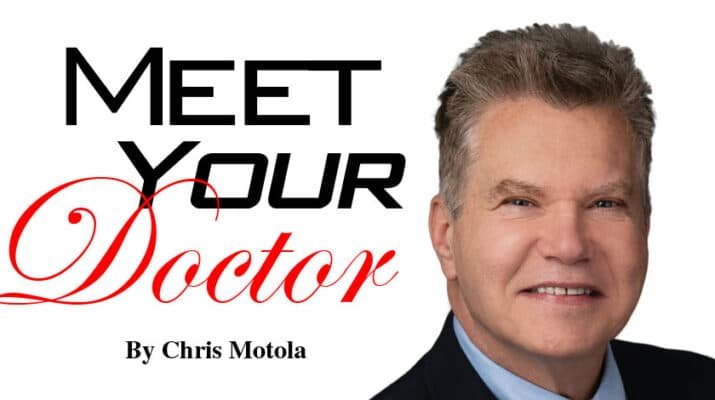Associated Medical Professionals’ newest radiation oncologist felt drawn to the field after the loss of his father to cancer
By Chris Motola

Q. You joined AMP in July this year. What drew you to this community?
A. I was at Massachusetts General Hospital Department of Radiation Oncology in Boston as a medical director. I was very excited to come to this area, first and foremost, to join this very dynamic group of doctors that combines treatment for a variety of patients, but predominantly for those who have genital-urinary issues. There are other things we treat like standard cancers. I knew this was an excellent group with excellent programs. It’s an area I’ve had a focus on for years. I know this area of New York because of friends and family and I also worked at Roswell Park in Buffalo in the late ‘90s. I know the area and the people well. Another thing that drew me here is in my other position as medical director; I was doing both administrative and clinical work. I wanted to focus on clinical. It was like two jobs. I wanted to focus on clinical. I can treat things I enjoy treating.
Q. What drew you to a career in treating cancer?
A. I had experienced as a young man in my early 20s the death of my father from prostate cancer. That motivated me to go into medicine, particularly for cancer. I went to medical school in Boston and was at first thinking of surgical oncology, but my background in biophysics led me to radiation oncology because I wanted to use my background and fight cancer. That drew me to this particular field. I had all my training in Boston at Harvard Medical School and worked out there most recently. I had worked initially at Roswell Park, both patient care and research. Then my focus has been on patient care.
Q. What are your professional goals?
A. I’m very much interested in obviously continuing the excellence in care but adding potentially other treatments to patients. That’s a general statement, but what I’m hoping to be able to do.
Q. What has proven the biggest challenge in your career move?
A. In medicine, it’s learning the people and the systems. There really haven’t been any big challenges. I’m very excited to be here and the people have been very friendly, and the doctors. Even the systems around the facility, the hospitals and the people I’ve met a have been terrific.
Q. What has been the most challenging about reopening as the quarantine period ended?
A. What excited me about this is the different doctors working in different specialties working in one unit provides effective, efficient care so patients don’t have to travel to different places and see different people. That can affect their planning. Especially in a time like this with COVID, we can spare patients long waits, traveling and deciding what’s the best treatment with a multi-disciplinary team that helps us expedite their care. I like working with colleagues this closely on a common cancer.
Q. What are the most recent innovations in cancer treatment?
A. The biggest type of innovation is corollary to what I just said. We’re combining systemic and local treatment. We can give patients treatment in cancers with radiation that treats local areas and combine it with treatments that work throughout the body like immune therapy, chemotherapy and hormone therapy. Those are just the main ones. To combine systemic treatment with local treatment that allows us to combine these treatments, we’ve seen improvement in eradication of cancer and improvement or extending survival in patients with metastatic disease where we didn’t see survival before. We treat primary cancer and metastatic sites. That’s a brand-new development. It’s a big one. We’ve come so far since years ago when once patients had metastatic spread; it was one treatment for the whole body or treating just where the cancer was. With radiation, we can provide targeted, accurate treatment to improve not only the accuracy but avoid other types of tissues to avoid side effects. That’s a big development in radiation. We can give types of doses that we couldn’t, that would cause more side effects. There are things we do now that we hadn’t even dreamed of.
Q. How do you keep up with advances in your field?
A. No sleep! Actually, like all of us, it’s a lifetime of learning and going to meetings and conferences. Now we can do a lot online. We work together in educating each other. We’re not alone in a vacuum. The urologists learn certain things and we learn certain things and we’re often on the same track for treating them. It maximizes the learning experience, being able to teach and learn from each other. It’s always a challenge. Things have changed so much over the decades. I’m very happy to be here and be part of this system and contribute to the community. I want to continue to bring things that I might have perspectives on that can bring new ideas.
Lifelines
Name: Gary M. Proulx, MD
Position: radiation oncologist with Associated Medical Professionals, Syracuse
Home state: New Hampshire
Now lives in: Liverpool
Education: Harvard Medical School
Fellowship: Clinical fellow in radiation oncology
Family: Wife, Sarah, and their grown daughter, Kylie
Hobbies: playing the guitar and writing mystery & suspense fiction. Proulx published “Seeds of Destruction” (Abbott Press: 2015) and is working on his second novel. He donates the proceeds from book sales to fund to cancer patient support programs.

